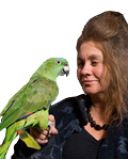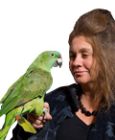 I took a deep breath and listened to the old bray of my heart. I am. I am. I am. - Sylvia Plath
I took a deep breath and listened to the old bray of my heart. I am. I am. I am. - Sylvia Plath
The self is formative to psychology. Indeed, the concept is so fundamental to the field that its existence is almost unquestioned. Nonetheless, the self is difficult to describe. Despite diverse methods of smoke and mirrors devised to render the mysterious into material, the self remains elusive, known but unknown.
It is also very personal, which may explain why it has taken so long for science to admit that animals other than humans have a sense of self. For in recognizing that someone purportedly as different as a cow, crow, or chimpanzee possesses the same essence that defines individual identity similar to our own [1], the illusion of human uniqueness vanishes as surely as the Emperor's new clothes. This week's Bear in Mind is dedicated to a very special self, Tom, a chimpanzee who endured years of incarceration and pain as a subject in biomedical experiments. On December 10, 2009, Tom died at the age of forty-four.
Viktor Frankl said that if one cannot change a situation, then one changes oneself. For thirty years, Tom could not escape his life behind bars, nor the routine, often life-threatening, procedures imposed upon his body. Still, he somehow survived. Undoubtedly, Tom had metamorphosed from the person who once reveled with his family in African landscapes before his capture. A glance at his medical history reveals the psychological and physical ravages of numerous laboratory experiments. But his essential self endured. After release into sanctuary, Tom became a wise and compassionate leader of other chimpanzee refugees similarly exiled from their homelands, even extending friendship to humans, the species that had caused his grievous suffering.
Yes, Tom had a self: proven both by the rigors of science [2] and by those who cared for and knew him [3]. Tom had a self, a great one, and one to whom we might all aspire. Thank you, Tom, for showing us true humanity.
[1] Bradshaw, G.A., J. Yenkosky, & E. McCarthy. 2009. Avian affective dysregulation: Psychiatric models and treatment for parrots in captivity. Proceedings of the Association of Avian Veterinarians. 28th Annual Conference, Minnesota.
[2] Bradshaw, G.A., T. Capaldo, G. Grow, and L. Lindner. 2009. Developmental context effects on bicultural Post-Trauma Self Repair in Chimpanzees. Developmental Psychology. 45: 5,1376-1388.
[3] http://www.faunafoundation.org
Gay Bradshaw, PhD, PhD is Executive Director of The Kerulos Center (www.kerulos.org). She is the author of Elephants on the Edge: What Animals Teach Us about Humanity, an in-depth psychological portrait of elephants in captivity and in the wild. Her work focuses on human-animal relationships and trauma recovery of species that include elephants, grizzly bears, tortoises, chimpanzees, and parrots.
Photo credit and copyright M. Seres
Courtesy Fauna Foundation


